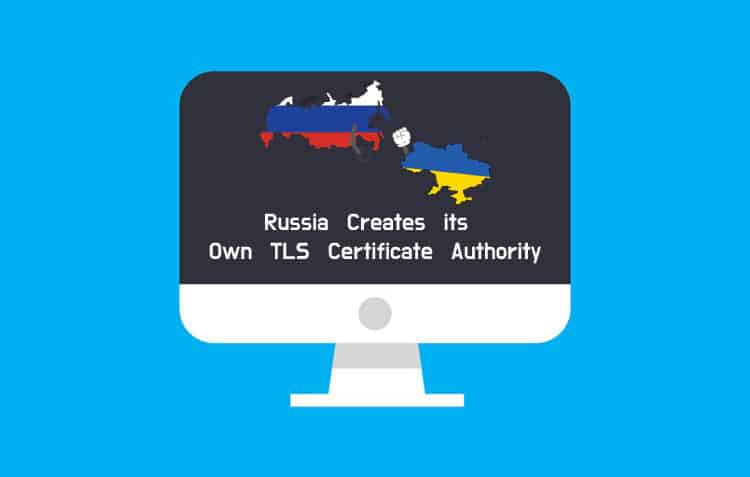Following the implementation of penalties by western companies that made it difficult to renew certificates, there has been an increase in the number of difficulties with website access. As a result, Russian authorities developed their trustworthy certificate authority(CA) for Transport Layer Security (TLS) to combat this issue.
TLS, or Transport Layer Security, is a widely used security technology meant to protect conversations over the Internet from eavesdropping. Encrypting interaction between web services or applications, such as a web browser loading a webpage, is the principal use case for TLS.
Secure Sockets Layer, often known as SSL or TLS/SSL, is a cryptographic protocol that helps protect the internet by encrypting data exchanged between your browser and the websites you visit and between the websites’ server the browser. According to DigiCert, certificates protect data transfer by keeping it private and preventing it from being modified, lost, or stolen.
Western governments and organizations have imposed limitations on Russian websites, making it hard to renew their Transport Layer Security certifications (TLS) certificates. The upshot is that browsers will block websites with expired certificates on their servers by default.
Due to this problem, the following web browsers display full-page warnings:-
– Chrome browser, developed by Google.
– Apple’s Web browser, Safari
– Microsoft’s Edge browser
– Mozilla Firefox
Through TLS certificates, which are utilized by browsers, a cryptographic key is securely linked to an organization’s information.
Russia has established a local trustworthy TLS certificate authority (CA) to assist Russian websites in renewing their TLS certificates and ensuring that they continue to provide services to visitors.
Before Russia invades Ukraine, websites hosted in the country would pay foreign certificate authorities (CAs) to renew their TLS certificates. However, because of the strong sanctions imposed due to the invasion, signing authorities in these Western nations can no longer take payments. As a result, they are unable to renew the certifications.
If a website certificate expires, the browser will notify the user that the page they are trying to access is unsafe. However, Russian authorities have established a local certificate authority (CA) to circumvent this difficulty.
TLS Certificate Authority in Russia
To resolve the issue of TLS certificate revocation and renewal on a national level, the government must provide a local solution.
Upon request, the Russian government will send a certificate to the site owner within five working days of receiving the request. Certificates are available to any legal company operating in Russia that meets the requirements.
At this point, only Yandex and Atom products accept Russia’s new certificate authority. Therefore, it is necessary to know if web browsers such as Google Chrome and Microsoft Edge will get certificates issued by the new Russian certificate authority and enable secure connections to certified servers to respond to this question.
The service is available to all legal companies doing business in Russia, and the certificates are supplied to site owners within 5 working days after they request them.
Certificates issued by TLS are used to digitally connect a cryptographic key to the specifics of an organization, allowing web browsers to verify the domain’s legitimacy and ensuring that communication between a client computer and the target website is safe.
The suggestion comes when businesses like DigiCert have been barred from doing business in Russia as a result of sanctions imposed by Western countries. Although the firm indicated in an updated alert that “validation of Russian orders may take longer to execute owing to additional inspections necessary for private organizations and individuals,” the company said that “we are allowed to provide all items to this nation.”
Uncertainty surrounds the intention of web browsers such as Google Chrome and Microsoft Edge and Mozilla Firefox, and Apple Safari to recognize and accept certificates issued by the new Russian certificate authority for secure connections to certified servers to function as intended.
Websites with certificates issued by Russia
There are already many websites that have gotten and are utilizing these state-issued certificates. In addition, the following Russian-owned certificate-using sites are listed below:-
– Sberbank
– VTB
– Russian Central Bank
According to sources in Russian media, the government has told 198 domains that they must use a local TLS certificate, even though the requirement has not yet been deemed mandatory.
But Russia’s root certificate may be used to intercept HTTPS traffic and launch many cyberattacks on targets.
Because Russia’s certificate authority has a low level of trust, the major browser makers are unlikely to include Russian root certificates in their respective root certificate stores.
As stated in a notification posted on Russia’s public service page, the certificates will take the place of foreign security certifications if they expire or are revoked by foreign certificate authorities. According to the webpage, the service is open to all legal firms doing business in Russia, with certificates being issued to site owners within a few working days after a request is submitted.


